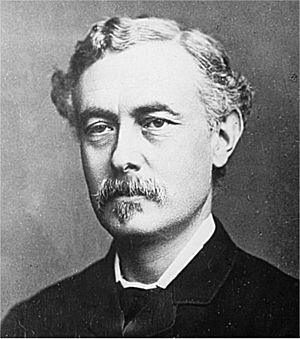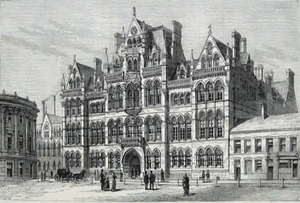William A. Tilden facts for kids
Sir William Augustus Tilden (born August 15, 1842 – died December 11, 1926) was an important British chemist. A chemist is a scientist who studies chemicals and how they react. Sir William found a way to make a substance called isoprene from turpentine. Turpentine is a liquid often used in paints. Isoprene is a key building block for rubber. Even though he made this discovery, he couldn't find a way to make synthetic rubber (man-made rubber) cheaply enough for businesses to use widely.
Quick facts for kids
Sir
William Augustus Tilden
|
|
|---|---|
 |
|
| Born | 15 August 1842 |
| Died | 11 December 1926 (aged 84) |
| Nationality | British |
| Education | Bedford Modern School |
| Alma mater | University of London |
Early Life and Education
William Tilden went to Bedford Modern School when he was young. He studied hard and earned two important degrees from the University of London. He received his first degree, a Bachelor of Science (BSc), in 1868. Later, in 1871, he earned his Doctor of Science (DSc) degree.
A Career in Chemistry
Sir William Tilden spent his life teaching and researching chemistry. From 1872 to 1880, he was a Senior Teacher of Science at Clifton College in Bristol. He then became a Professor of Chemistry at Mason College from 1880 to 1894. This college later grew into the University of Birmingham.
After that, he moved to the Royal College of Science in London. He was a Professor of Chemistry there until 1909. He also served as the Dean of the college from 1905 to 1909. Even after retiring, he remained an Emeritus Professor.
Awards and Recognition
Sir William Tilden was a very respected scientist. In 1880, he became a Fellow of the Royal Society. This is a special honor for top scientists in the United Kingdom. He was also the Vice-President of the Royal Society from 1904 to 1906.
In 1908, he received the Davy Medal. This medal is a very important award given by the Royal Society for outstanding work in chemistry. He also led the Chemical Society as its President from 1903 to 1905.
To remember his contributions, the Chemical Society created the Tilden Prize in 1939. This prize is still given every year to three younger chemists by the Royal Society of Chemistry. Sir William was also involved in many other scientific groups, showing his dedication to chemistry.
 | Lonnie Johnson |
 | Granville Woods |
 | Lewis Howard Latimer |
 | James West |


